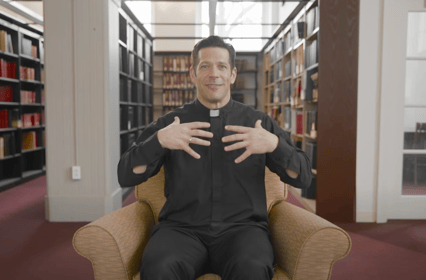Practices that increase our awareness, mindfulness, and resilience are incredibly useful tools when it comes to managing stress or tending to our mental health, but there is something else that can help us see our lives as they really are and flourish: prayer.
Practices that build awareness, mindfulness, and resilience help us understand ourselves and discover who we want to become — but they come with a liability. They can become warped tools that turn us inward, reducing us to self-centered navel gazers who are only concerned about ourselves.
Prayer is different. When we pray, we’re not talking to ourselves. We’re not simply practicing our coping mechanisms. We’re talking to Someone — we’re talking to God. We’re building a relationship — spending time with the One who made us, the One who knows our every gift and our every flaw better than we ever could, the One who loves us more deeply than we could ever imagine.
And here’s the really remarkable thing: When we talk to God, God talks to us in return. Prayer isn’t a soliloquy — it’s a conversation, a dialogue. The challenge for us is to make room to listen for God in that exchange. Just like our conversations with friends and family, we can fall into the trap of the one-sided relationship, where everything is about us and the other person scarcely has a chance to get a word in edgewise. So prayer is also an invitation to mutuality, to openness, to vulnerability in the presence of the other person.
God wants more than anything to be in a relationship with you. God created you specifically for this relationship. And the way you build that relationship with God is through prayer. This doesn’t mean that you have to become a cloistered nun or immediately join a monastery. It doesn’t mean that you have to start praying the Rosary every single day, or spend hours poring over the Bible. Developing a prayer life is just like building any other good habit or honing a muscle: You have to start small, or else you’ll crumble under the weight of your own expectations.
So where can you start?
Start with what you know. Perhaps once upon a time you learned the words of the Lord’s Prayer, also called the Our Father. Way back in the first century after Christ, the earliest Christian communities prayed the Lord’s Prayer three times every day — at morning, noon, and either in the evening or at night. You can do the same today.
You might be wondering if you can really build a relationship with God by saying this simple prayer three times each day. Given that the whole process will take you five minutes maximum, this idea may even sound a little superstitious. Can such a short time spent in prayer really work?
It’s important to note that the thrice-daily commitment isn’t a magic spell. It’s not like tapping your heels together three times and expecting to be transported back to Kansas. The daily commitment is for our benefit, not God’s. It ensures that three times each day, we’re stepping away from our worldly concerns — even just for a moment — to turn our attention to our relationship with God, who is always there, waiting in love for us to talk to Him. And over time, God will do amazing things with the time that we offer in prayer, even if it’s just a few moments each day.
This simple practice opens us up to a deeper relationship with our heavenly Father, whom we address in this prayer. We grow in relationship with Jesus, God’s Son, our Lord, who taught his disciples — and us — the words of this prayer in the first place. We grow in relationship with the Holy Spirit, because prayer itself is our response to the Holy Spirit moving within our hearts, inspiring us to pray.
And when we really take the time to pray these words slowly and thoughtfully, the Lord’s Prayer can change us. Praying “give us this day our daily bread” can help us move to a greater trust and reliance on God, who has promised to provide for our every need. Asking God to “forgive us our trespasses as we forgive those who trespass against us” can challenge us to acknowledge and let go of any grudges we’re holding against others. Saying “thy will be done” can invite us to surrender our lives completely to God.
There’s a lot packed into this short prayer. Many of us learned these words as children, but all of us will spend our lives learning how to pray it well and live it out. The good news is that our loving God — Father, Son, and Holy Spirit — will always be there to meet us in prayer. We just have to show up.
